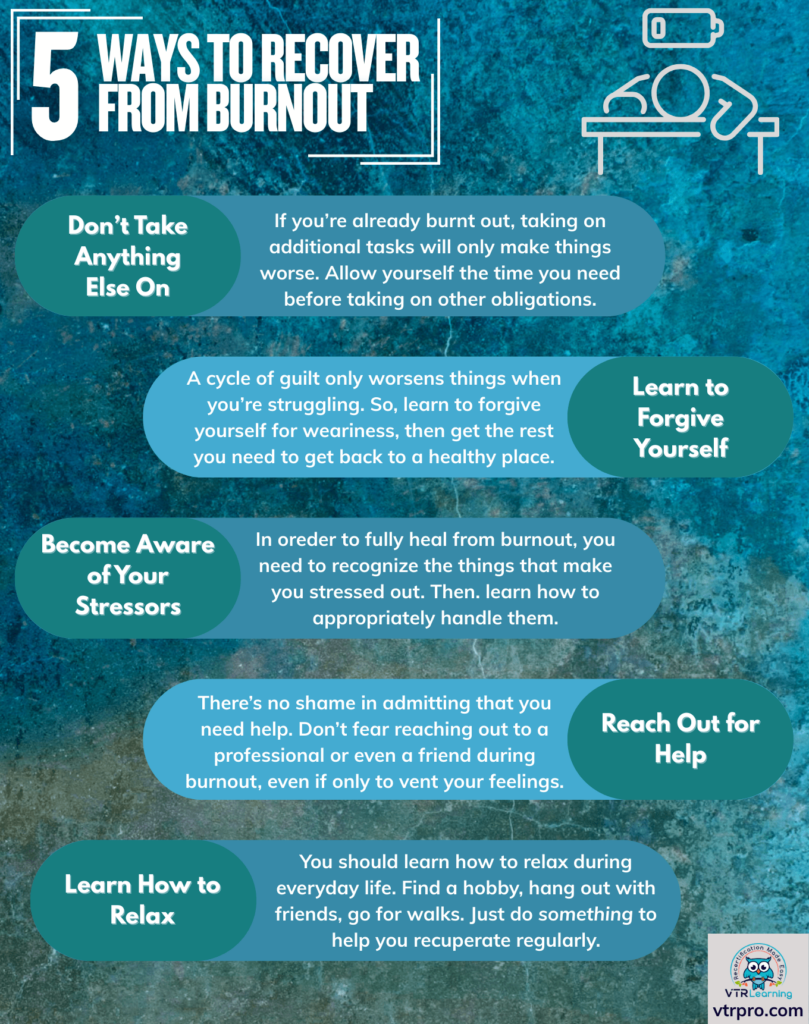![How to Recover from Burnout [5 Healthy Tips]](https://assets.vtrlearning.com/wp-uploads/2024/04/How-to-Recover-from-Burnout-in-the-Workplace.png)
When dealing with burnout, the line between prevention and recovery easily becomes blurred. Because many of the same methods apply equally well before and after burnout occurs. In other words, discovering how to recover from burnout often means knowing what could prevent it in the first place. For example:
- Make sure that you get adequate amounts of sleep
- Keep a journal that you write your thoughts in regularly
- Find something to do that makes you happy
- Exercise often and make sure you eat well
But since we’ve already discussed many of these ways to prevent mental exhaustion elsewhere, we wanted to narrow our view and focus on five other methods detailing how to recover from burnout. Of course, these few tips alone could be enough to help get you back to a healthy physical and mental state. But they work best when employed together. So, if you find a certain combination doesn’t work for you, make sure to switch things up and give other methods a shot.
Every person has different needs, and that holds true when it comes to discovering how to recover from burnout. Just because something works well for one individual doesn’t necessarily mean it will for the next. So, if you find yourself experiencing symptoms of burnout, keep that in mind. It could be key to both prevention and recovery from this all-too-common issue.

Share this Image On Your Site
How to Recover from Burnout Without Sacrificing Your Job
1. Don’t Take Anything Else On
One of the first and most important steps to take whenever you find yourself mentally and physically exhausted from work is to be honest about your health. Because, at the end of the day, burnout is a health issue. It can have decidedly detrimental impacts on both your body and mind, especially if you remain in that state for long periods of time. So, learn how to admit to yourself and others that you’re having a difficult time.
If you can’t be honest about burnout, you’ll find it nearly impossible to keep from taking on extra tasks. You need to develop a sense of self-awareness that alerts you to the strain your work and responsibilities pose. That way, you increase your understanding of what sorts of tasks you can handle and which you might need to offload.
Since burnout often relates directly to the amount of tasks you have from day to day, you need to take time to reassess them. In this interim period, it’s important not to take on additional work, because it can keep you from accurately assessing your capacity.
It might be intimidating to admit and explain to managers that you’ve reached a place of exhaustion. But because it’s a common occurrence, your company’s leaders should have a decent understanding of its effects. Explaining to them that you need time to reassess your work can help them know not to load you down with new expectations .That way, you can begin recovering with the support of those around you.
This goes equally well for activities outside the workplace. After all, burnout doesn’t recognize boundaries. So, whether that’s extra religious activities, sports, or something else, take a step back for the time being so you can relax and recuperate.
2. Learn to Forgive Yourself
Unless you discover how to have grace for yourself, you won’t really understand how to recover from burnout. After all, this can lead to intense feelings of guilt which, themselves, lead to further burnout. In that sense, it poses a vicious cycle that keeps you physically exhausted and mentally worn down. however, if you can break that cycle, understand burnout for what it is, and accept that it doesn’t make you any less a good employee, you’ll be off to a great start.
Moreover, you must understand burnout doesn’t make you any less of a person or undeserving of others’ affection. There are ways you can prevent burnout from happening, but that’ doesn’t necessarily mean you will prevent it. We’re finite beings with limited capabilities for expectations and commitments. So, when we load ourselves down with obligations, we have to be careful. Otherwise, there will inevitably come a crash point.
However, if that point occurs, it only means you’re human. So, do what you can to learn forgiveness for yourself. Burnout is hard enough without the added weight of self-deprecation and feelings of guilt. This process could take quite a while, but in the end, it will lead to a healthier mindset overall.
3. Become Aware of Your Stressors
If you aren’t self-aware, burnout can occur over and over again. Because without that sort of attention, you can’t easily recognize the things that cause you to lose steam in the first place. The ability to identify your stressors and mitigate their impact is essential both to recovery and future prevention. So, if you’re unable to even point a finger at the triggers of your exhaustion, you need to take time to reassess and identify them.
Really, any number of things could cause unwanted stress an lead to negative results:
- High-intensity work tasks
- Family issues
- Conflict with a coworker
- Existing health complications
The list could go on and on, nearly endlessly, because every person has their own set of things which cause anxiety. However, it’s impossible to negate these stressors if you can’t understand what they are.
So, whether or not you’re in a state of burnout, take time to assess the things in your life which cause you mental distress. Then, if you have the ability, determine ways to offset the anxiety those things cause. Unless you do that, recovering from burnout will become much more difficult. At that point, the fight is an upstream battle, trying to force yourself against a current of continuous stress.
4. Reach Out for Help
Now, in a sense, this tip for how to recover from burnout isn’t exactly new – we discussed something similar in another blog. However, it’s so absolutely vital that it bears stating again. Whether that’s help from a professional, from a coworker, family member, or someone else, surround yourself with people who care. Sometimes, simply having someone listen to you talk is enough to momentarily relieve stress and anxiety weighing you down. That’s why therapy is such a helpful activity for people going through various difficulties.
This tip also encapsulates the need for you to be honest with your managers and bosses, so they understand what’s going on. Often, this will allow them to be more lenient until you recover. Alternatively, they might have experienced burnout themselves and can point you toward helpful resources.
Ultimately, this all goes back to the first point – be honest with yourself and others about where you’re at. If you need help, don’t hesitate to ask for it. Your managers should want you to succeed, because when you do, it’s best for the organization. And if they don’t, then they need to reassess their own priorities to see why they don’t fall in line with the overall good of the team.
5. Learn How to Relax
At least in part, burnout is the result of an inability to relax. Whether that’s because you have too many obligations on your plate or simply don’t know how to stop going, there will come a point when your body forces you to slow down. So, learning how to take things easy and allow time for yourself to enjoy life is essential.
If you’re currently in a state of burnout, start small. Look for one thing you can do each day that helps form better habits of relaxation. It might be reading before bed, going on a leisurely walk during midday, or playing video games in the evening. Interestingly, relaxation doesn’t always mean you stop going. It could instead mean finding something you enjoy and pouring yourself into it. However, you have to be careful not to let these forms of entertainment stack up into further obligations.
Hanging out with friends is fun until you feel like you have to. Going for a walk is nice unless you push yourself too hard to make a certain distance every day. Relaxation is, in a sense, releasing yourself from obligation for a short period. So, whatever you do for enjoyment, create a sacred space that allows it only for your happiness. In the end, this might be exactly how to recover from burnout.
Discover Other Aspects of Burnout
Although burnout often leads to exhaustion, there are times when it might have alternate effects. For example, if you’re stressed and anxious with your current work, you could become restless and search for other more immediately fulfilling ventures. And that’s just as true for organizational leaders as it is for their employees.
Our courses on the topic of leadership take a closer look at some of these impacts and how restlessness can lead to costly and unsuccessful ideas. If you want to know more about this interesting subject, check out our course, Fostering Organizational Unity.
Last Updated:



![The Biggest Challenges of Working Remotely [5 Problems]](/wp-content/uploads/2021/05/Top-Challenges-of-Working-Remotely.png)

